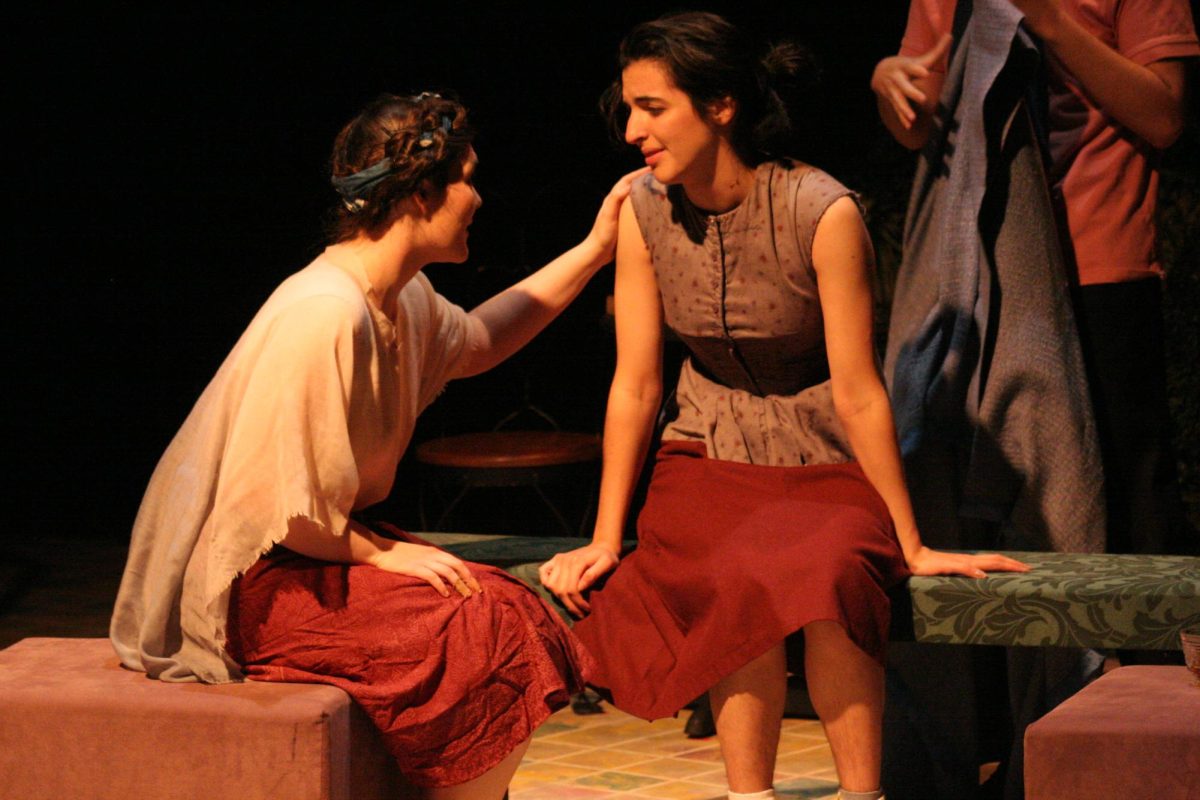Editor’s Note: This piece contains mentions of sexual assault.
Galatea Erupted is a play written by College fourth-year Ashton Doll and directed by College fourth-year Becca Dulaney. It is showing in the Kander Theater April 25–28 as part of the Oberlin Theater Lab Series. The play is a senior capstone production, originally written for Professor of English and Comparative Literature and Chair of Book Studies Wendy Hyman’s Shakespeare and Metamorphosis class. Overall, it is an insightful, moving, and thought-provoking play. The performance is 45 minutes with no intermission, yet the brevity does not shorten the impact of the content nor does it hinder the powerful performances from the actors. The play tackles heavy topics regarding consent, domestic abuse, and overcoming sexual trauma within the patriarchal Greek literary tradition.
The six-person cast — College first-year Milo Antoniades as Galatea, College first-year India-Mae Fraser as Daphne, College second-year Ev Ackert as Lo, College first-year Chanina Kosovske as Ganymede, and College third-years Sophie Raymond and James McCreary as members of the ensemble — all give strong, engaging performances. The cast is able to conceptualize and relay the content seamlessly while being guided by a beautifully written script.
Antoniades gave an absolutely standout performance. Their ability to portray a broken young woman recovering from a traumatizing relationship, all while coming into herself and finding support, was profound. Antoniades’ ability to portray this message with grace and strength is particularly striking; their versatility as an actor is unmistakable.
Another distinct performance came from Ackert. They play a wise matron and a guiding figure throughout the play, and their performance is incredible. Their character’s calm and wise presence matched with true strength shines through. Ackert’s storytelling is unmatched and their stage presence is powerful.
The storyline follows a group of individuals who all participate in a book club together. The play follows them as they guide, support, and strengthen one another with their shared experiences. The show opens with all characters on stage attending the book club, when the frightened Galatea runs in begging for help. This opening scene sets a precedent for the rest of the play, as they all quickly run to do everything they can to help her. It is revealed later that all characters in the show have experienced similar situations and that their understanding is what bonds the group. Discussing themes of sexual assault and domestic abuse can be difficult, but Dulaney’s direction, staging, and execution, combined with Doll’s script, approaches these topics beautifully. The characters’ relationships emphasize the importance of connection and community to overcome abuse. The show’s message is beautifully executed.
The Kander Theater, although small, feels like the perfect space to watch this production. Scenic designer, College fourth-year Bri Jaffe, beautifully adorned the space, making full use of all that a small black box theater has to offer. Half of the back wall of the Kander was covered with greenery and couches, resembling a teahouse. It is this area of the set where the book club scenes in the show take place. The other half of the back wall is set up more like a living room, made to be Daphne’s home. It is here that we see important conversations between Galatea and Daphne, as well as larger scenes within the cast. The ability of the scenic designer to create a set that truly encompasses the totality of the plot line seamlessly is incredibly impressive. While the whole set was astounding, the most striking detail was the tile planets painted on the bottom of the stage, which were intricate and beautiful. Contributing to the Greek mythic tradition, these visuals were tools for the actors and audience alike. The actors utilized them often, as each member of the main cast had a moment of spotlighted monologue in one of these spaces. These moments were by far the most touching. The size of the space combined with the speech of those on stage allowed for a personal moment between the actors and the audience.
Galatea Erupted comes at an important time; as April comes to a close and Sexual Assault Awareness Month ends, the play brings up a necessary conversation. Our community can learn so much from Galatea Erupted, and the play puts so much emphasis on the importance of support and community as tools for growth. The playwright and the director do excellent jobs of approaching sensitive yet important content from an original standpoint, using the patriarchal conventions of Greek mythology as a tool for discussion. The actors, set, light and sound design, script, staging, and direction all fuse to create a beautiful production that promotes important conversations regarding survival, recovery, and community.












